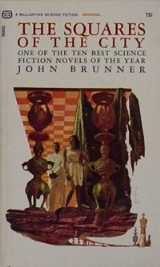
The Squares of the City
Encyclopedia
The Squares of the City is a science fiction
novel
written by John Brunner
and first published in 1965 (ISBN 0-345-27739-2). It was nominated for the Hugo Award for Best Novel
in 1966.
It is a sociological story of urban class warfare and political intrigue, taking place in the fictional South America
n capital city of Vados. It explores the idea of subliminal messages as political tools, and it is notable for having the structure of the famous 1892 chess
game between Wilhelm Steinitz
and Mikhail Chigorin
. The structure is not coincidental, and plays an important part in the story.
found the novel to be more artifice than fiction, saying "this is a confusing, overpopulated, almost-unidentifiable-with story set in a city which seems to have been created for the sole purpose of having Brunner set a 'human chess game' in motion upon it. . . . There is nothing in particular here to catch and hold the reader's involvement." Judith Merril
, however, found Squares "an impressive piece of work." with "complexities [that] add richness rather than spread confusion." She noted, however, that the demands of the novel's "elaborate structure" weakened it by impelling Brunner to sacrifice character development in order to depict "interpersonal exchanges."
Science fiction
Science fiction is a genre of fiction dealing with imaginary but more or less plausible content such as future settings, futuristic science and technology, space travel, aliens, and paranormal abilities...
novel
Novel
A novel is a book of long narrative in literary prose. The genre has historical roots both in the fields of the medieval and early modern romance and in the tradition of the novella. The latter supplied the present generic term in the late 18th century....
written by John Brunner
John Brunner (novelist)
John Kilian Houston Brunner was a prolific British author of science fiction novels and stories. His 1968 novel Stand on Zanzibar, about an overpopulated world, won the 1968 Hugo Award for best science fiction novel. It also won the BSFA award the same year...
and first published in 1965 (ISBN 0-345-27739-2). It was nominated for the Hugo Award for Best Novel
Hugo Award for Best Novel
The Hugo Awards are given every year by the World Science Fiction Society for the best science fiction or fantasy works and achievements of the previous year. The award is named after Hugo Gernsback, the founder of the pioneering science fiction magazine Amazing Stories, and was once officially...
in 1966.
It is a sociological story of urban class warfare and political intrigue, taking place in the fictional South America
South America
South America is a continent situated in the Western Hemisphere, mostly in the Southern Hemisphere, with a relatively small portion in the Northern Hemisphere. The continent is also considered a subcontinent of the Americas. It is bordered on the west by the Pacific Ocean and on the north and east...
n capital city of Vados. It explores the idea of subliminal messages as political tools, and it is notable for having the structure of the famous 1892 chess
Chess
Chess is a two-player board game played on a chessboard, a square-checkered board with 64 squares arranged in an eight-by-eight grid. It is one of the world's most popular games, played by millions of people worldwide at home, in clubs, online, by correspondence, and in tournaments.Each player...
game between Wilhelm Steinitz
Wilhelm Steinitz
Wilhelm Steinitz was an Austrian and then American chess player and the first undisputed world chess champion from 1886 to 1894. From the 1870s onwards, commentators have debated whether Steinitz was effectively the champion earlier...
and Mikhail Chigorin
Mikhail Chigorin
Mikhail Ivanovich Chigorin also was a leading Russian chess player...
. The structure is not coincidental, and plays an important part in the story.
Reception
Algis BudrysAlgis Budrys
Algis Budrys was a Lithuanian-American science fiction author, editor, and critic. He was also known under the pen names "Frank Mason", "Alger Rome", "John A. Sentry", "William Scarff", and "Paul Janvier."-Biography:...
found the novel to be more artifice than fiction, saying "this is a confusing, overpopulated, almost-unidentifiable-with story set in a city which seems to have been created for the sole purpose of having Brunner set a 'human chess game' in motion upon it. . . . There is nothing in particular here to catch and hold the reader's involvement." Judith Merril
Judith Merril
Judith Josephine Grossman , who took the pen-name Judith Merril about 1945, was an American and then Canadian science fiction writer, editor and political activist....
, however, found Squares "an impressive piece of work." with "complexities [that] add richness rather than spread confusion." She noted, however, that the demands of the novel's "elaborate structure" weakened it by impelling Brunner to sacrifice character development in order to depict "interpersonal exchanges."

